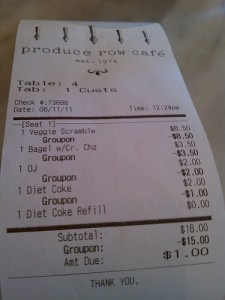
A couple of evenings ago, I went to a little spot around the corner from my house, here in the far north side of Chicago. It’s a friendly little place, and I like it quite a bit — their prices are fair, their food is decent, and some of the folks on staff recognize me and say ‘hi’ when I come in. What’s even better is that they have a nice selection of microbrews, scotches, and even some really rare stuff from time to time.
So, I’m sitting at the bar, enjoying a burger and a Guinness, and a fellow comes in and stands next to me while he collects his order from the bartender. He’d ordered a to-go order of some sort of food, and I noticed he was using a Groupon to help pay for it.
“So,” I asked the bartender, “what are your thoughts on the whole Groupon thing?”
The bartender surprised me with his reply. “It may well put us out of business,” he said.
Turns out, they’d offered a Groupon deal nearly a year ago, and people were bringing quite a few of them in now, just before they expired. I asked him how it happened that they were losing money on the offer they made.
In fairness, he said that they (the restaurant) was partially to blame. See, the idea was that the Groupon would be offered at a small loss, and they’d make it up by getting more customers in the door, and hopefully would make them in to regulars. But it didn’t turn out that way.
Unsurprisingly, I suppose, the folks that ended up buying the Groupons were not really interested in checking out new places which they’d then begin to frequent. In reality, the Groupon buyers were the absolute cheapest customers possible, and were ONLY looking to maximize the amount of stuff they got for their dollar.
These customers were using the Groupon deals for delivery or pickup food. Again, nothing wrong with that, but it meant that they weren’t sticking around to order another round of drinks, or a dessert, or something else which might offset the loss the bar was taking to bring them in the door. It also meant they weren’t coming back in once the Groupon was used. These weren’t new customers, they were freeloaders.
In fact, I asked about the fellow who had just picked up his order. The bartender told me the guy had paid $25 for the $50 Groupon, of which the bar got 50% ($12.50). He paid an additional $5 on the tab. So the total amount the bar took in from this transaction was something on the order of $17.50. The bartender told me he had gotten about $55 worth of food out of the deal.
And the guy didn’t even bother leaving a tip.
Groupon sold many hundreds of these deals for my little neighborhood spot. If, on average, they’re losing $30 or so per transaction, and never making up the loss with new business, it’s easy to see how my friendly neighborhood bar was hemorrhaging money on the deal.
Now again, you can certainly argue that the bar should have thought about what they were offering, and I could be sympathetic if this was the only example of this sort of backwards economics. But it’s a common story among small, local businesses that using Groupons to bring in new customers means they lose lots and lots of money.
Furthermore, it can’t last, as Rocky Agrawal points out in this excellent TechCrunch article.
So I can’t bring myself to participate in the Groupon scam.
There’s the notion that everyone in the US is a die-hard capitalist, intent on making as much money as possible, no matter what. But personally, I subscribe to what I like to think of as the Golden Rule of economics:
It’s not a good deal unless it’s a bargain for the buyer AND the seller.
If it’s not good for everyone involved, then it’s not something I want to participate in. There’s enough ways to make money in the universe that I don’t have to resort to fucking other people over. And, were I to try to take advantage of these small businesses in my community, often run by sole proprietors, often staffed by their family, then I’m not just doing a disservice to the business, but a disservice to my community as a whole.
Is that the kind of society you want to live in?
And let’s look at the top of the equation here. Some analysts are saying that Groupon’s effectively a giant ponzi scheme. In the filings for their IPO earlier this month, Groupon revealed it lost $389.6 million in 2010. Think about that number for a minute.
And where is the money going? Into the pockets of the CEO and early investors, according to Peter Kafka:
Groupon raised a total of $946 million in two funding rounds last winter. It kept $136 million of it help run the money-losing company. The remaining $810 million was paid out, via stock purchases, to CEO Andrew Mason and some of his backers, including Eric Lefkofsky, and, notably, the Samwer brothers, who sold their CityDeal company to Groupon in 2010.
Are these the kind of people you want to be doing business with? Multi-millionaires building their personal fortunes by driving small, local businesses into bankruptcy all over the country, at a time when small-business growth is key to getting our economy and employment numbers back on some kind of sane course?
Not me, my friends. I’m not going to be a part of that.
A final nail in the coffin: At the end of my meal, I asked the bartender for a glass of scotch. There was a particular single-malt I’d had the last time I was in, and I thought a couple of fingers would be a great close to my meal.
“Sorry, we don’t have that any more,” the bartender told me. “We can’t afford to stock the good stuff any more, because we’re losing so much money from the Groupons.”
Seriously, Groupon, I hate you.
(This article was corrected on 6/17/2011 at 5:02 PM CDT, to reflect accurate calculations on the actual Groupon sale.)

1 thought on “Why I’m never going to buy a Groupon”
Comments are closed.